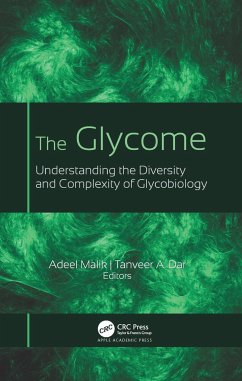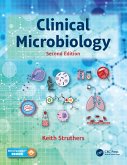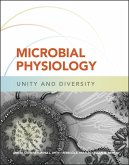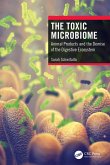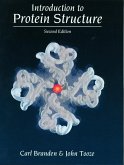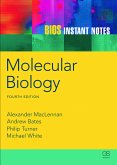The Glycome
Understanding the Diversity and Complexity of Glycobiology
Herausgeber: Malik, Adeel; Dar, Tanveer A.
The Glycome
Understanding the Diversity and Complexity of Glycobiology
Herausgeber: Malik, Adeel; Dar, Tanveer A.
- Gebundenes Buch
- Merkliste
- Auf die Merkliste
- Bewerten Bewerten
- Teilen
- Produkt teilen
- Produkterinnerung
- Produkterinnerung
This book details state-of-the-art developments and emerging challenges of glycome biology, which are going to be key areas of future research, not only in the glycobiology field but also in pharmaceutics.
Andere Kunden interessierten sich auch für
![Clinical Microbiology Clinical Microbiology]() J. Keith Struthers (Consultant Medical Microbiologist, Coventry, UnClinical Microbiology42,99 €
J. Keith Struthers (Consultant Medical Microbiologist, Coventry, UnClinical Microbiology42,99 €![The Geochemical Origin of Microbes The Geochemical Origin of Microbes]() William F. MartinThe Geochemical Origin of Microbes104,99 €
William F. MartinThe Geochemical Origin of Microbes104,99 €![Microbial Physiology Microbial Physiology]() Ann M. Stevens (VA Virginia Tech)Microbial Physiology76,99 €
Ann M. Stevens (VA Virginia Tech)Microbial Physiology76,99 €![The Toxic Microbiome The Toxic Microbiome]() Sarah SchwitallaThe Toxic Microbiome37,99 €
Sarah SchwitallaThe Toxic Microbiome37,99 €![The Natural Anti-Gal Antibody as Foe Turned Friend in Medicine The Natural Anti-Gal Antibody as Foe Turned Friend in Medicine]() Uri GaliliThe Natural Anti-Gal Antibody as Foe Turned Friend in Medicine61,99 €
Uri GaliliThe Natural Anti-Gal Antibody as Foe Turned Friend in Medicine61,99 €![Introduction to Protein Structure Introduction to Protein Structure]() Carl Ivar BrandenIntroduction to Protein Structure112,99 €
Carl Ivar BrandenIntroduction to Protein Structure112,99 €![BIOS Instant Notes in Molecular Biology BIOS Instant Notes in Molecular Biology]() Alexander McLennan (UK University of Liverpool)BIOS Instant Notes in Molecular Biology27,99 €
Alexander McLennan (UK University of Liverpool)BIOS Instant Notes in Molecular Biology27,99 €-
-
-
This book details state-of-the-art developments and emerging challenges of glycome biology, which are going to be key areas of future research, not only in the glycobiology field but also in pharmaceutics.
Hinweis: Dieser Artikel kann nur an eine deutsche Lieferadresse ausgeliefert werden.
Hinweis: Dieser Artikel kann nur an eine deutsche Lieferadresse ausgeliefert werden.
Produktdetails
- Produktdetails
- Verlag: Apple Academic Press Inc.
- Seitenzahl: 338
- Erscheinungstermin: 8. Juli 2021
- Englisch
- Abmessung: 240mm x 161mm x 23mm
- Gewicht: 690g
- ISBN-13: 9781771889971
- ISBN-10: 1771889977
- Artikelnr.: 62229274
- Herstellerkennzeichnung
- Libri GmbH
- Europaallee 1
- 36244 Bad Hersfeld
- gpsr@libri.de
- Verlag: Apple Academic Press Inc.
- Seitenzahl: 338
- Erscheinungstermin: 8. Juli 2021
- Englisch
- Abmessung: 240mm x 161mm x 23mm
- Gewicht: 690g
- ISBN-13: 9781771889971
- ISBN-10: 1771889977
- Artikelnr.: 62229274
- Herstellerkennzeichnung
- Libri GmbH
- Europaallee 1
- 36244 Bad Hersfeld
- gpsr@libri.de
Adeel Malik, PhD, is a Research Professor at the Institute of Intelligence Informatics Technology, Sangmyung University, Seoul, South Korea. He obtained his PhD from the Department of Biosciences, Jamia Millia Islamia (JMI), New Delhi, India. During his PhD, he developed computational methods for the prediction of carbohydrate binding sites in proteins using sequence and evolutionary information. This was the first sequence-based method to predict the carbohydrate binding sites in proteins. Later he joined School of Computational Sciences, Korea Institute for Advanced Study (KIAS), Seoul, South Korea, to pursue his postdoctoral fellowship. As a part of his research, he investigated plant lectin-carbohydrate interactions via community-based network analysis by using glycan array data. He also worked as an Assistant Professor at Perdana University Center for Bioinformatics (PU-CBi), Malaysia from 2014-2016. Dr. Adeel has broad research interests in the area of bioinformatics that include protein-carbohydrate interactions, machine learning, NGS, etc. He has also to his credit several research publications in peer-reviewed international journals, book chapters, and edited books with international publishers. Tanveer A. Dar, PhD, is Assistant Professor in the Department of Clinical Biochemistry, University of Kashmir, India. Dr. Dar received his master's degree in Biochemistry from Hamdard University, New Delhi, India, and a PhD in Protein Biophysics from Jamia Millia Islamia, New Delhi, India. After completing his doctorate, Dr. Dar joined as a postdoctorate at the University of Montana, Missoula, USA, where his main research area involved characterization of protein denatured states. Dr. Dar's research interests mainly include i) structural and functional characterization of glycosylated therapeutic proteins from medicinal plants and ii) role of chemical chaperones/osmolytes in modulating fibrillation/aggregation of proteins. He has authored more than 40 publications in both national and international journals of repute in the field of protein biophysics and proteomics and is also a recipient of an INSA visiting fellowship from the Indian National Science Academy (INSA), India. In addition to this, Dr. Dar has co-authored a number of edited volume books published by internationally reputed publishers, including Springer and Elsevier.
1. Trends and Advancements in Glycobiology: Towards Development of
Glycan-Based Therapeutics 2. Defects in the Human Glycome: Congenital and
Non-Congenital Disorders 3. Glycome in Immunological Processes: Current
Scenario and Future Prospects 4. Role of Glycans in Neurodegeneration 5.
Glycome in Metastasis: Glycan Remodeling and Tumor Progression 6. Glycans
in the Host-Pathogen Interaction 7. Glycome in Microbial Infections and
Immune Evasion 8. Acylation as a Vital Post-Glycosylation Modification of
Proteins: Insights and Therapeutics Prospects 9. Glycome Profiling in
Plants: Towards Understanding the Scenario of Carbohydrates 10. Sugars:
Coping the Stress in Plants
Glycan-Based Therapeutics 2. Defects in the Human Glycome: Congenital and
Non-Congenital Disorders 3. Glycome in Immunological Processes: Current
Scenario and Future Prospects 4. Role of Glycans in Neurodegeneration 5.
Glycome in Metastasis: Glycan Remodeling and Tumor Progression 6. Glycans
in the Host-Pathogen Interaction 7. Glycome in Microbial Infections and
Immune Evasion 8. Acylation as a Vital Post-Glycosylation Modification of
Proteins: Insights and Therapeutics Prospects 9. Glycome Profiling in
Plants: Towards Understanding the Scenario of Carbohydrates 10. Sugars:
Coping the Stress in Plants
1. Trends and Advancements in Glycobiology: Towards Development of
Glycan-Based Therapeutics 2. Defects in the Human Glycome: Congenital and
Non-Congenital Disorders 3. Glycome in Immunological Processes: Current
Scenario and Future Prospects 4. Role of Glycans in Neurodegeneration 5.
Glycome in Metastasis: Glycan Remodeling and Tumor Progression 6. Glycans
in the Host-Pathogen Interaction 7. Glycome in Microbial Infections and
Immune Evasion 8. Acylation as a Vital Post-Glycosylation Modification of
Proteins: Insights and Therapeutics Prospects 9. Glycome Profiling in
Plants: Towards Understanding the Scenario of Carbohydrates 10. Sugars:
Coping the Stress in Plants
Glycan-Based Therapeutics 2. Defects in the Human Glycome: Congenital and
Non-Congenital Disorders 3. Glycome in Immunological Processes: Current
Scenario and Future Prospects 4. Role of Glycans in Neurodegeneration 5.
Glycome in Metastasis: Glycan Remodeling and Tumor Progression 6. Glycans
in the Host-Pathogen Interaction 7. Glycome in Microbial Infections and
Immune Evasion 8. Acylation as a Vital Post-Glycosylation Modification of
Proteins: Insights and Therapeutics Prospects 9. Glycome Profiling in
Plants: Towards Understanding the Scenario of Carbohydrates 10. Sugars:
Coping the Stress in Plants

